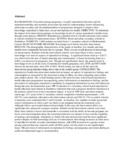| dc.description.abstract | BACKGROUND:
Unwanted teenage pregnancy, sexually transmitted infections and the attendant morbidity and mortality necessitate the need for understanding factors influencing adolescent sexuality and the implementation of programmes designed to improve their knowledge, reproductive behaviour, sexual and reproductive health.
OBJECTIVE:
To determine the impact of an intervention package on knowledge levels of various reproductive health issues through trend analysis.
DESIGN:
Randomized controlled trial of a health education intervention in schools stratified for representativeness.
SETTING:
Rural and urban secondary schools in Zimbabwe.
SUBJECTS:
1,689 students recruited from 11 secondary schools in Mashonaland Central.
MAIN OUTCOME MEASURE:
Knowledge level before and after intervention.
RESULTS:
The demographic characteristics of the pupils at baseline, five months and nine months were comparable between the two groups. There was an overall increase in knowledge on menstruation. Students from the intervention schools were more likely to have correct knowledge over time on aspects of reproductive biology. A significant linear trend (p = 0.017) was observed in the area of family planning and contraception. A linear decreasing trend (p = 0.001) was observed on pregnancy risk. Though not significantly linear, the general trend of knowledge levels in all the areas of reproductive health, pregnancy risk, STDs and HIV/AIDS showed an upward trend, from 20% to 96%. Worth noting was that in all the areas the intervention group had knowledge above that in the control group.
CONCLUSION:
The reproductive health education intervention had an impact on aspects of reproductive biology and contraception as measured by the increased scoring at follow up when comparing intervention and control schools. The overall findings point to the need for early school based reproductive health education programmes incooperating correct information on reproductive biology and the prevention of subsequent reproductive morbidity by imparting information on non-risk behaviour during the early developmental years.
PIP:
Evaluation of a secondary school-based reproductive health education intervention in Zimbabwe indicated that such a program should be introduced at the primary school level to have maximum impact. A total of 1689 rural and urban students (mean age, 13.5 years) from 11 secondary schools completed a baseline questionnaire. 1159 (68.7%) were randomly allocated to the intervention schools and 530 (31.3%) to control schools; evaluations were conducted after 5 and 9 months. At baseline, few students in either group had correct information on when a girl was likely to get pregnant during the menstrual cycle. Although follow-up revealed improved knowledge in this area, the intervention effect was significant only among the youngest students. Students in the intervention schools were more likely than controls to know that menarche is associated with the ability to become pregnant, but fewer were knowledgeable about the association between wet dreams in boys and the capability of making a girl pregnant. Attendance at family life education lectures had the most significant positive impact on both knowledge and use of contraception. Knowledge increases in other areas of reproductive health, sexually transmitted diseases, and AIDS increased to a greater extent among exposed than non-exposed youth (20-96% gains), but the trend was not significantly linear. The provision of information on reproductive biology and pregnancy prevention during an earlier developmental stage is recommended. | en |

